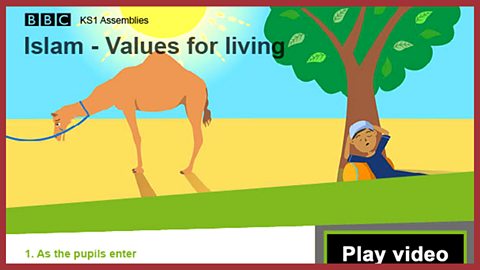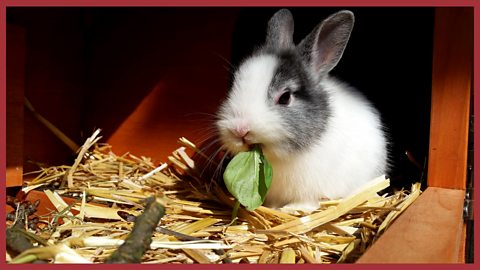In short...
Themes: learning from the life of the Prophet; caring for all living things.
Summary: The assembly starts with a game about pets, encouraging children to think about how they take responsibility for caring for animals they have at home. The remainder focuses on two stories from the life of Muhammad (pbuh) about caring for animals. Muslims use the phrase 'peace be upon him' after saying the Prophet's name as a sign of respect (abbreviated to pbuh).
Resources: physical items relating to pet care, or use the gallery of images.

The video
The video contains information about Islam and is set within the context of a Muslim family. There are two stories: The Prophet and the Ants and The Crying Camel, both of which are from the life of the Prophet and show how he used everyday occurrences to teach important truths about Allah (God) and how to live a good life.
The first story tells how Muhammad saves an ant colony from a fire that his followers have mistakenly lit too close to the ants' nest.
In the second a man leaves his camel out in the sun while he sleeps in the shade, prompting the Prophet to speak to him on the importance of caring for animals.
Duration: 3' 44"
End of speech: '…what stories Ameena would tell him tomorrow'.
Video questions
- What religion do Ameena and her family follow? (Islam - the family are Muslims)
- What special book does Ameena's family have at home? (The Qur'an - or Koran)
- What has Ameena's father told her about the words of the Qur'an? (That the words of the Qur'an are the words of God, spoken to the Prophet by an angel and written down later by the Prophet's friends)
- What happens in the story The Prophet and the Ants? (The Prophet's followers light a fire too close to an ants' nest. The ants flee prompting the Prophet to tell his followers that God cares for all animals. The fire is put out and the ants return.)
- What happens in the second story - The Crying Camel? (It is a very hot day and the Prophet hears the crying of a camel. The camel has been tied to a tree in the burning heat of the sun, while the animal's owner sleeps in the shade. The Prophet speaks to the owner, telling him that the camel is as much a part of God's world as they are.)
- What does Ameena tell her little brother Raheed at the very end? (That it is very important to care for all animals equally)

Key links
Download / print the assembly framework ready for use

Slideshow: caring for our pets. image
What aspects of pet care are shown in the pictures?


Suggested framework
1. Entry music
A song emphasising caring and compassion, or the fragility of life - eg 'Fragile' by Sting
2. Introduction
The opening activity requires some props: soft toys of various animals and some physical items relating to the care of those animals. You could involve your own class in sourcing these beforehand. Then match each physical item to the pet represented by the soft toy to show a different aspect of pet care. You could use: cat (a clean litter tray and scoop); hamster / rabbit (a water bottle - pets need fresh water); dog (collar and/or lead - some pets need regular exercise); fish (fish food - we need to feed our pets regularly). Alternatively use the gallery of images and discuss the care needs of each of the animals shown. Then: 'In a moment we're going to watch two short stories about the Prophet Muhammad (pbuh). He said that 'Caring for animals is a kind of worship', teaching his followers that looking after animals is a way of worshipping Allah who created them. The Prophet used to take great care of his own camels when he was travelling and would make sure that their needs were taken care of even before he knelt to pray.
3. The video
The overall duration is 3' 44". At the start there is a short introduction to Islam and to Ameena's family, who are Muslims. The story 'The Prophet and the Ants' starts at 1' 15" and ends with the words: '…and that is the story of 'The Prophet and the Ants' said Ameena'. A second story, 'The Crying Camel', follows at 2' 38" and ends with the words: '…and promised to take care properly from now on.' The video then returns to Ameena and her brother, Raheed, ending with the words: '…Raheed hurried to bed, excited to hear what stories Ameena would tell him tomorrow'.
4. After the video
Use the story questions to help the children recall the events of the video. 1. What religion do Ameena and her family follow? 2. What special book does the family have at home? 3. What has Ameena's father told her about the words of the Qur'an? 4. What happens in the story 'The Prophet and the Ants'? 5. What happens in the story 'The Crying Camel'? 6. What does Ameena say to her little brother Raheed at the very end?
5. Time to talk
Help children to understand how important the words of the Prophet are to Muslims and how Muslims seek to learn from his life. Talk about how one / both of the stories illustrate this. Relate this to how the children might show care for animals themselves - eg putting out food and water for birds in winter. 'The Prophet Muhammad (pbuh) taught that caring for animals is really important. Think for a few moments about something you could do to care for the creatures of our world…' Then share feedback if time allows.
6. Time to sing
An opportunity to sing your chosen song. Suggestions from ≥…»ÀøÏ ÷ collections are below.
7. Opportunity for reflection
We've been thinking today about caring for animals…and how the Prophet Muhammad said caring for animals is very important…We can all do something to care for the creatures in our world…
Caring for our pets for a start…
But there are many other creatures in our world as well - and, as we heard in our stories, they all need our care…
From tiny creatures like birds, who we can help with food and water…
Right through to finding out about endangered species and doing whatever we can to make sure they survive.
8. Opportunity for prayer
Dear God. Thank you for our pets and all the other creatures that you have made and want us to look after.
Help us to give them the care, love and attention that they need in order to live happy and healthy lives.
Amen.

Suggested songs
He's got the whole world
He’s got the whole world, in His hand,
He’s got the whole wide world, in His hand,
He’s got the whole world, in His hand,
He’s got the whole world, in His hand.
- He’s got the wind and the rain, in His hand,
He’s got the wind and the rain, in His hand,
He’s got the wind and the rain, in His hand,
He’s got the whole world in His hand.
Chorus
- He’s got the sun and the moon, in His hand,
He’s got the sun and the moon, in His hand,
He’s got the sun and the moon, in His hand,
He’s got the whole world in His hand.
Chorus
- He’s got the plants and the creatures, in His hand,
He’s got the plants and the creatures, in His hand,
He’s got the plants and the creatures, in His hand,
He’s got the whole world in His hand.
Chorus
- He’s got everybody here, in His hand,
He’s got everybody here, in His hand,
He’s got everybody here, in His hand,
He’s got the whole world in His hand.
Chorus
'He's got the whole world'- Instrumental (Come and Praise, no 19)
He’s got the whole world, in His hand,
He’s got the whole wide world, in His hand,
He’s got the whole world, in His hand,
He’s got the whole world, in His hand.
- He’s got the wind and the rain, in His hand,
He’s got the wind and the rain, in His hand,
He’s got the wind and the rain, in His hand,
He’s got the whole world in His hand.
Chorus
- He’s got the sun and the moon, in His hand,
He’s got the sun and the moon, in His hand,
He’s got the sun and the moon, in His hand,
He’s got the whole world in His hand.
Chorus
- He’s got the plants and the creatures, in His hand,
He’s got the plants and the creatures, in His hand,
He’s got the plants and the creatures, in His hand,
He’s got the whole world in His hand.
Chorus
- He’s got everybody here, in His hand,
He’s got everybody here, in His hand,
He’s got everybody here, in His hand,
He’s got the whole world in His hand.
Chorus
| Song | Collection | Significant words |
|---|---|---|
| 'From the tiny ant' | Come and Praise: Beginning, no 32 | 'Care for them it's up to you / us' |
| 'He's got the whole world' | Come and Praise: Beginning, no 36 (see Related links) | 'He's got the plants and the creatures, in His hand' |

Related links
